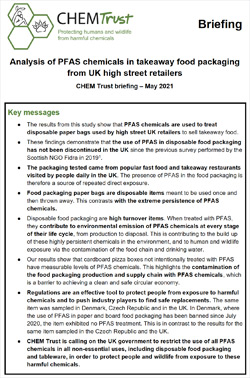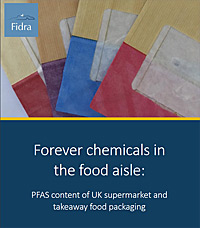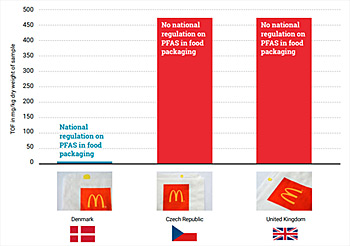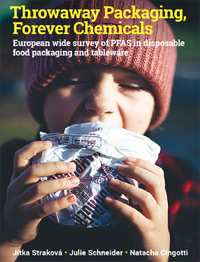Over the last decade, incidence rates for cancers in children have increased by a tenth (10%) in the UK.
Rates in girls have increased by 12%, Rates in boys have increased by 8%
Fast food has always been a concern because of obesity in both children and adults that they contribute to. But Cancers and reproductive health concerns are also implicated, as a result of carcinogenic food wrappings containing human made PFAS chemicals that leach into the food and are ingested and remain in the human body for a lifetime.
Comprising of more than 4,700 chemicals, per and polyfluorinated alkyl substances (PFAS) are a group of widely used, man-made chemicals that accumulate over time in humans and in the environment.
 CHEM trust and seven other not for profit organisations have published a new scientific investigation showing that harmful, persistent PFAS chemicals are used in disposable take-away food packaging in the UK and across Europe. These results show that PFAS continues to be widely used in UK takeaway food packaging, with little change since 2019, when Fidra tested packaging in a similar study.
CHEM trust and seven other not for profit organisations have published a new scientific investigation showing that harmful, persistent PFAS chemicals are used in disposable take-away food packaging in the UK and across Europe. These results show that PFAS continues to be widely used in UK takeaway food packaging, with little change since 2019, when Fidra tested packaging in a similar study.
The food packaging items from the UK investigated during this study included cookie and pastry bags from popular fast food chains and takeaway restaurants McDonald’s, Gregg’s, Pret-a-Manger, and Subway, and the high street supermarket Co-op.
Three pizza boxes from Papa John’s, Domino’s and Pizza Hut were also investigated. These samples were analysed by scientists in independent laboratories in Denmark and the Czech Republic.
All samples of food packaging items analysed in the course of this study had measurable levels of PFAS chemicals, including items that had not been intentionally treated with PFAS.
This is similar to the findings from Fidra in 2020, where PFAS were present in 95% of the samples tested as reported by Fidra’s study, available from the Unionsafety E-Library.
Some cancer causing PFAS emitted today could still be present in the environment in several centuries. This represents a threat for both current and future generations of people and wildlife. This raises legitimate questions about their multiple consumer and industrial uses, including their use in disposable products such as disposable food packaging.
PFAS migrate from the packaging into the food, adding to the overall PFAS
exposure to carcinogens of the general population.
When you consider that in the UK, parents take their children to McDonald's 'as a treat', our children's food poses a serious risk to their health, because these carcinogenic chemicals present in food wrappings contaminate the food ; with the results being that the child then ingests that contaminated foods.
PFAS are persistent and are often referred to as forever chemicals. Once they enter the environment, they do not readily degrade. Some PFAS have estimated half-lives of over 1,000 years. PFAS are also extremely mobile, meaning they travel easily throughout our environment and can be found far from their original source. Many PFAS are considered bioaccumulative, they concentrate up food chains and are not easily expelled from the human body. 99% of Americans have PFAS in their blood and numbers are now considered to be similar all over the world. (Report: Forever Chemicals In The Food Aisle.)
Child cancers are on the increase in the UK by 8 to 10%
Scientific studies have associated exposure to a number of PFAS with severe adverse health effects, including cancer, impacts on the immune, reproductive and hormone systems, as well as reduced response to vaccinations.
Fertility rates in males are decreasing in the general population in the UK, research has found.
The more we learn about these chemicals, the more reason there is for concern, and the more urgent it becomes to minimise emissions and exposure.
In a recent survey commissioned by CHEM Trust, 81% of people in the UK said that they would stop buying a product (e.g. specific cosmetics, cookware, furniture, clothing etc.) if they found out that by using the product they would be exposed to harmful chemicals.
78% said they would stop buying a product if they found out that by using it or disposing of it, wildlife would be exposed to harmful chemicals.
 Dr Kerry Dinsmore, Projects Manager and PFAS lead at Fidra says:
Dr Kerry Dinsmore, Projects Manager and PFAS lead at Fidra says:
‘Almost 12,000 people signed Fidra’s recent petition asking UK supermarkets to remove PFAS from their food packaging and it’s brilliant to see Co-op listening to their customers and taking action to remove these harmful chemicals. This is a great example for others to follow, and a clear indication to policy-makers that a ban on PFAS in UK food packaging is both necessary and feasible, right now’
In the context of this study, CHEM trust contacted all of the companies whose packaging was tested to share the results and ask what steps they are taking to remove PFAS from their packaging. We received responses from McDonald’s, who reaffirmed their commitment to remove PFAS from all their customer products globally by 2025, and from the Co-op, who have been engaging with Fidra since its 2020 study.
Cathryn Higgs, Head of Policy at Co-op said:
"Co-op is committed to designing own-brand products with quality, sustainability and health in front of mind, ensuring our packaging is created in a responsible way. We are actively working on how to remove PFAS from the very small number of own-brand products affected.”
CHEM Trust’s view: time for the UK government to act
These commitments by UK retailers are a positive step forward, however CHEM Trust’s view is that legal action is needed to ensure that harmful chemicals are not present in consumer products, including food packaging.

Our study shows that in Denmark, where a ban on PFAS in food packaging has been in place since July 2020, french fries bags from McDonald’s are not treated with PFAS chemicals. The same item was bought in the UK at the same time and was found to be treated with PFAS chemicals.
66% of people in the UK think the UK Government should be the one taking action to ensure hazardous chemicals are not present in food packaging.
 CHEM Trust is therefore calling on the UK government to phase out all unnecessary uses of PFAS, including in food packaging, and to restrict these substances as a group. In our view, it is the only way to:
CHEM Trust is therefore calling on the UK government to phase out all unnecessary uses of PFAS, including in food packaging, and to restrict these substances as a group. In our view, it is the only way to:
- Prevent emissions of all PFAS chemicals.
- Stop the accumulation of these highly persistent chemicals in the environment and our bodies.
- Protect UK citizens and wildlife from exposure to these harmful substances.
Dr Julie Schneider, Campaigner at CHEM Trust and co-author of the study said:
“Every year of delay in regulating this group of ‘forever chemicals’ increases the pollution burden for current and future generations of people and wildlife. Some PFAS emitted today could still be present in the environment in several centuries.
A ban on all non-essential uses of PFAS chemicals should be urgently implemented.”
Further information and the documents in this article, can be found in the Unionsafety E-Library using search word 'Cancer'.
Source: Cancer Research UK / Chemtrust / Friends of the Earth Germany / The Health and Environment Alliance (HEAL) / European Environment Agency / FIDRA





